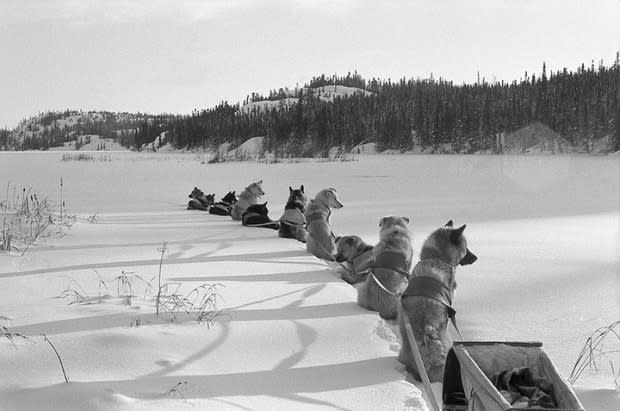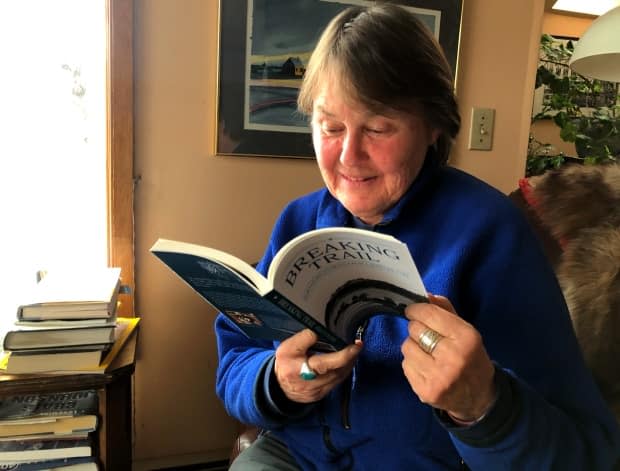'You feel like you're flying': Yellowknife author relives her time mushing dog sleds in new book
Yellowknife, and its Old Town in particular, have changed since Fran Hurcomb first arrived in the 1970s from Ottawa.
"You could tie your dogs behind your house. You could keep all your equipment in your yard. And it was very much that way. And this was not a fancy end of town at all … they were barely serviced," she said.
In those first few years, Hurcomb had formed a dog sled team after initially "resisting" it and she was well-transitioned from what started out as adventure travel to the North to making a home out of it.
"The whole approach to life was really, really different," she said of Old Town, comparing it to now. "The people who made their living off the land then aren't doing that here anymore. It's changed and people have changed in their approach to the land."
Now, Hurcomb, who mushed various dog sled teams for 20 years, has published a new book, Breaking Trail, a series of short stories, which she says pulls her back into those earlier memories.
"Every single story would take me back. And I think about the people in it and think, what happened?" she said.
"I'd read it out loud … and I'd get to the end and I'd just about be in tears. And I think ... I've read this 100 times. I wrote it, I've been over it — every word of it — and it would still bring back something.
"As I think about it now, that adventure just turned into real life pretty quickly."
Dogs a 'really big part'
Many of the stories in her new book go back to the theme of dog sleds, a reflection of her own life.

For the first few years of living in the N.W.T. after having grown up in Ottawa and "secretly" wanting a dog sled team of her own, she says she "resisted" the urge to actually form one.
But then she bought a puppy and caved.
"Dogs have been ... a really big part," she said.
"The devotion of those dogs was quite something and their willingness to work for you — like they were so dedicated. It was really quite wonderful."
Hurcomb says training a dog sled team taught her how to work physically hard at a task, which up until that point when she got the dogs in her mid-20s, she never had to do.
"I hadn't grown up on a farm or somewhere where that was really necessary … But I had to work for those dogs and they had to work for me … I learned a lot about patience and love and freedom," she said.
Her patience was stretched too. One problem, Hurcomb notes in her book, was the dogs didn't want to stop, sit or stay at first.
"They only wanted to go," the book reads. "The only way I could stop them was to drag my feet or in extreme cases, flip the toboggan on its side and jump on it. That would usually stop them."
In the story, she says she also figured out the best order for that particular team — Pogi in front, followed by Freebie, Cabbage, Skunk then Haywire. (Spoiler: Haywire, as the name suggests, never really calmed down, she says).
One story relives a vivid feeling for her — when her team left Hurcomb behind on an ice road.
"I just remember the fury I felt watching them disappear, kind of laughing at me as they left and went to have a good time somewhere," she said. "So that intensity came back. Every time I read that story, I feel it."
But the pay off of the dog sled team was worth the effort.
"The best thing — you pull the hook and take off and it's just dead quiet and you're just whizzing across the snow and the ice and you feel like you're flying," Hurcomb said.
She never thought she'd stop mushing dogs, she said, though eventually, she did.
Stories are her truth
The tales in her book are a mixture of real life and her own creativity, she says.
"Most of the stories are based in fact — things I remember happening, of course, other people might not remember them the way I did. And then I've turned them into stories," she said.

"They aren't 100 per cent true, they aren't 100 per cent fiction."
That is, except the last story which she says is based on a person but the story is fiction. The story, in a way, is a bit of an outlier compared to the rest of the stories, she said.
But for Hurcomb, she says the stories are true because they are what she remembers happening in her life.
"The truth is a shifty kind of thing, isn't it?" Hurcomb said.
In one of the stories involving a wild cat, Hurcomb says she recalls it "like it was yesterday, I can see it." But her friend, who is the other character in it, says she doesn't remember it all.
"It's like, 'oh, maybe I made it up.' I don't know anymore," Hurcomb said. "But it was a good story."
In her book, Hurcomb quotes the late Rene Fumoleau, a well-known priest, photographer and storyteller with a long history in the North.
"He said, 'Once a story's been told or written down, it becomes the truth,'" Hurcomb said.
For her, that rang true. And, as she read and relived those stories over again, she said it was good for her — Haywire dog and all.


